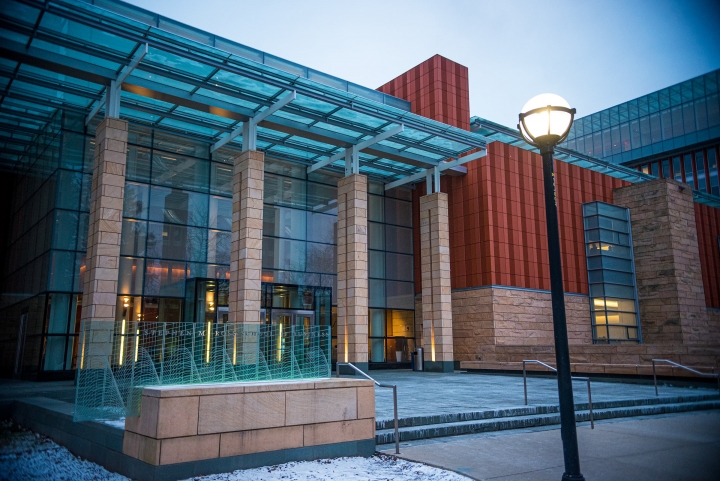
The Erb Institute, a collaboration between the Ross School of Business and the School for Environment and Sustainability, hosted an event on Wednesday night to discuss how businesses can promote sustainability in their work.
The event featured David Blood, co-founder and senior partner of Generation Investment Management, and a panel of four other speakers. They spoke to a crowd of about 500 students, faculty and community members in the Robertson Auditorium in the Ross School of Business.
Blood described his previous experience in the industry and how he became involved in sustainability.
“I spent 18 years at Goldman Sachs and made the decision to retire in 2003,” Blood said. “I told my partners that I was going to set up a sustainable investment firm and they basically laughed and said, ‘This confirms what we knew about you all along: you’re crazy.’”
Blood co-founded GIM with Al Gore, a climate activist and former U.S. Vice President, in 2004. He said his interests in sustainability and development and Gore’s passion for environmental protection resulted in the successful business model they currently use.
“My interest is in poverty and social justice and sustainable development,” Blood said. “Al’s is obviously an interest in the environment. And when we were talking that first day, we recognized that they are the same issue. They’re the same coin, they’re just different sides.”
Following Blood’s comments, three other panelists joined him on the stage. Chad Spitler, founder and CEO of Third Economy, moderated the panel and posed various questions to each of the speakers.
In response to a question about efforts to combat climate change, Michael Dorsey, partner at Ibersun Solar and a member of Club of Rome, said many countries initially promised to provide large amounts of money but have not fulfilled that promise.
“So if you had $5,000 of housing damage and I came along and gave you $1, you might want to get in my face,” Dorsey explained. “Essentially, that’s what governments have done, particularly in the case of Africa, so it’s not just that we haven’t assembled enough money. The money that we’ve assembled is actually, I would offer, is generating climate injustice.”
Jennifer Haverkamp, director of the University’s Graham Institute and law professor, said she believed the government should still have an important role in generating and implementing climate change solutions.
“I think there is still an important role for government,” Haverkamp said. “The United States government right now is not at the table, but when you think about how the prices of renewables have gone down a certain amount, China was doing that to help lower the cost of solar panels and things like that.”
Blood agreed with Haverkamp, saying he thought the government needed to be involved in the process in addition to other outside organizations.
“As much as I’d like to say we can sort this out from capital markets and business, we cannot,” Blood said. “Business will be part of the solution, civil society will need to be part of the solution, and we are now getting to the point where we will need active involvement in government.”
At the end of the event, the panelists took audience questions submitted through Twitter.
One Twitter user asked how society can transition to a low carbon economy if Business students are not required to learn about the climate in many core classes.
Following loud applause, a faculty member in the audience said the deans are currently working on implementing a related change.
Business sophomore Mia Zapata came to the event because she is taking an organization studies class about business and sustainability. She said she thought Business students should be required to take a class about this topic or attend mandatory events.
“I think that it’s really important that we be able to have that opportunity,” Zapata said. “I know for me personally, I didn’t even realize that until we asked the question, but then I realized that we really don’t actually have any conversation about it within a Ross core class. I think we should have something focused on sustainability.”
Dorsey said awareness of climate change is vital to being an employee in today’s workforce.
“So there’s gonna be three big things that will happen if you don’t have this knowledge,” Dorsey said. “You risk dying because you’re from the generation of the 20th century, you risk being fired because now this shift is happening. It’s here, so you die, get fired, or you risk being unemployed. Because the shift is happening.”
The final question the panel answered was about how to solve climate-related problems in a time of political polarization.
Liesl Clark, director of the Michigan Department of Environment, Great Lakes and Energy, said she approaches her government work with her children in mind.
“When I approach how I do my work in Lansing, what drives me, first of all, is my kids,” Clark said. “I think when you start with, ‘We want the same thing, how can we get there?’ I think you can really see your progress.”
Haverkamp agreed and said she believed bipartisanship surrounding climate-related issues will become increasingly common in the following years as public opinion shifts.
“From a political perspective, you get bipartisanship around issues when both parties feel like their voters expect them to act in that area,” Haverkamp said. “As the polls come back that more and more people see the effects of climate change and understand how real it is, more and more people on both sides of the aisle are going to feel the pressure to come up with policies that we need.”
Reporter Emma Ruberg can be reached at eruberg@umich.edu.

